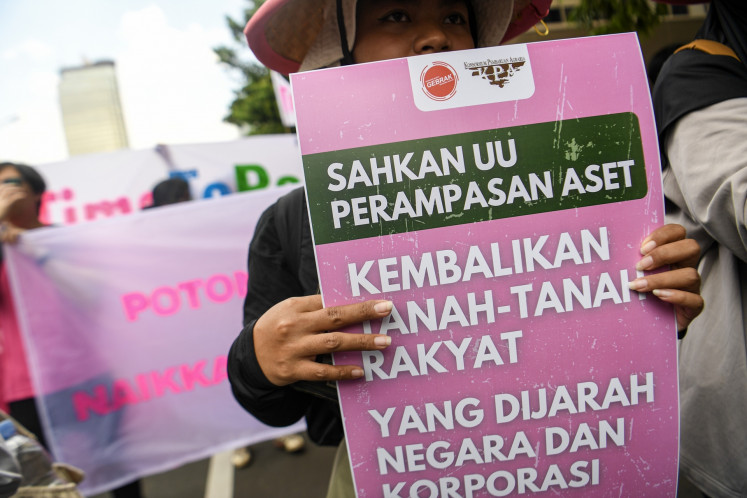Popular Reads
Top Results
Can't find what you're looking for?
View all search resultsPopular Reads
Top Results
Can't find what you're looking for?
View all search resultsHow reputation can affect your corporate growth and public perception
A great brand may take 20 years to build but minutes to destroy.
Change text size
Gift Premium Articles
to Anyone
G
lobal giants like Adidas, Credit Suisse, Meta, Silicon Valley Bank, Sam Bankman-Fried, Elon Musk, and Kanye West are prominent examples that have seen the downfall of their reputations. What was once a success became nothing in just a snap.
Yet, this trend is not new especially for Indonesia. History has thrown up many examples of reputational crises, from political scandals to corporate missteps.
In a 2015 Deloitte Survey, 87 percent of the executives surveyed rated reputation risk as “more important” or “much more important,” with 88 percent explicitly focusing on reputation risk as a key business challenge. Eight years later, this remains a priority for businesses all over the world.
Reputation, be it personal or professional, is one of the hardest assets for anybody to maintain with consistent effort. Elon Musk who was once revered for his entrepreneurial vision is now viewed in a more negative lens by many, given the events surrounding his takeover of Twitter – showing how vulnerable a company’s or leader’s reputation and the ripple effects spokespeople can cause.
So if you are a leader or an organization, why should you be paying more close attention to reputation risks now more than ever? For one, there is an expectation for companies and brands to meet ethical commitments that are honored continuously, with high scrutiny on the actions of CEOs and company management.
Technology is a prominent factor that exacerbates the threat reputation risk poses. For example, with social media, the amplification of such risks is wider today than in the past - which makes it more important that organizations and leaders take reputation management seriously.
Post-pandemic, many companies have transitioned to software and platforms that create connections while enhancing operations. Most meetings are now held on Zoom and Google Meets. There have been continuous advancements made to improve employee productivity. Furthermore, the increasing number of users who are moving toward digital-first transactions has prompted organizations to adopt digital transformation in their services.
However, this sets a company up for more risk of data breaches and cybersecurity threats.
Take for example the unfortunate fate of Jenius where a customer lost Rp 110 million (US$ 7,406) due to a phishing scam. The issue went viral and reports revealed numerous similar cases. The outcome made consumers skeptical of the app’s safety protocols.
This single incident eroded client trust and highlighted the need for robust security against privacy breaches. This however, is not an isolated case, as Indonesia reported a 22 percent surge in cyberattacks during the first quarter of last year alone, with the number of attacks reaching over 11.8 million. Moreover, an Interpol report stated that the country has more ransomware attacks compared to any other country in Southeast Asia.
If one analyses the cybersecurity breaches occurring the last two to three years, they all follow the same trajectory: The affected organization suffers financial loss, reputational damage, and likely sees a drop in customer numbers and even stock value, causing further financial harm. Therefore, managing reputation and cyber risk are inextricably linked.
According to a report, 53 percent of consumers are likely to stop supporting a brand in times of data breaches. But when presented a clear resolution approach, 72 percent may return to trust them. With this in mind, companies need to consider various methods to curb cyber threats that could affect organization reputation and stakeholders – be it routine internal cybersecurity audits and training.
The harm to reputation can come internally too and not just from external sources.
Workplace discrimination against women remains a recurring issue that requires attention. Existing exploitation cases of sexual harassment, denied pregnancy leave, violence, and unequal wages reflects Indonesia’s slow progress towards gender equality. This persists in women’s unpleasant view of an organization, as gender policies are not taken seriously despite numerous laws in place.
United Nations revealed that Indonesia's gender inequality index is among the highest of the ASEAN countries. Statistical data such as wage differences between women and men can highlight the gap of both genders.
Companies' can mitigate this issue by protecting women’s rights and providing equal opportunities and applying good diversity, equity, and inclusion (DEI) policies to the workforce.
At present, acknowledgement of DEI policies counts as the bare minimum. Genuine respect helps enforce good people management – creating an environment where individuals of different cultures can come together, feel safe, and empowered to achieve their full potential. Company stakeholders want to understand the organization’s purpose and values. Recognizing the importance of DEI and clearly communicating it is a critical element to building trust and a strong reputation.
Enforcing DEI training for upper management, who are principal representatives of a company, helps pinpoint areas of improvement for managers that can benefit a company financially, while increasing employee commitment, productivity and mental health.
The rise of wokeism and “cancel” culture plays a huge role in misinformation. With public online platforms being free-for-all, a company’s online presence is under heavy scrutiny and is continuously at risk of being on the wrong side of public perception.
Information gets circulated swiftly on the internet and might possibly misconstrue public opinions made by an organization. A once-honest business may transition into an enemy of the public in the matter of seconds, placing emphasis on creating a well-grounded persona on all digital platforms.
Keeping an eye out on insights would also contribute to sentiment analysis and lower misinformation that could damage reputation, essential for all businesses who need to improve their reputation as stakeholders to have a better understanding of how they are being perceived. Sentiment analysis also allows companies to readjust their strategy and branding to have a higher appeal with the audience.
In a report from Deloitte discussing the strengthening of critical competencies within a company, 58 percent of corporate affairs directors interviewed had indicated data and insights as their number-one competency to strengthen.
Companies need to equip publicity personnel with the proper analytics and tools in order to be aligned with good digital marketing practices that lowers the risk of online reputational damage.
Reputation defines a successful company, and should be a priority to maintain. A great brand may take 20 years to build but minutes to destroy. Understanding the areas of reputational risk helps prevent potential public relation crisis, giving the business more energy to focus on development and growth.
In today’s digital world, a company’s reputation does not solely exist in the real world, but is indented forever online – in search engines, social media platforms, online forums and news sites. With newer outlets and platforms of connectivity, companies need to be conscientious about their presence in the digital world to maintain a consistent reputation in its entirety.
***
The writer is managing partner of Europe and Asia for the Penta Group.











